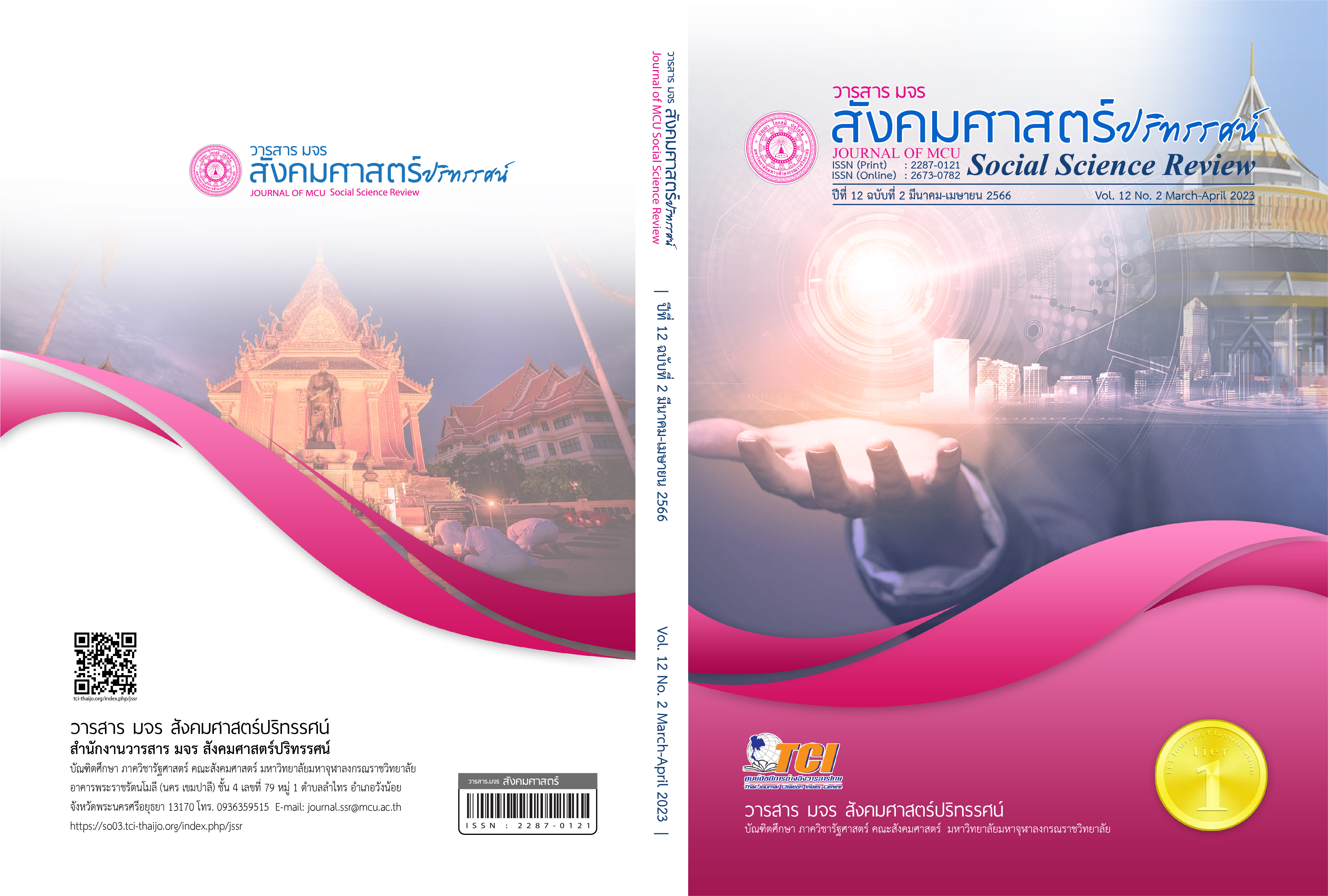นโยบายและความตั้งใจในการใช้งานรถยนต์ไฟฟ้า
คำสำคัญ:
การรับรู้ประโยชน์, รถยนต์ไฟฟ้า, การรับรู้ความสะดวกสบาย, ทัศนคติที่มีต่อการใช้งานบทคัดย่อ
งานวิจัยนี้มีวัตถุประสงค์เพื่อศึกษาปัจจัยในการเลือกใช้เทคโนโลยีรถยนต์ไฟฟ้า วิเคราะห์ความสัมพันธ์ระหว่างปัจจัยในการเลือกใช้รถยนต์ไฟฟ้ากับระดับความตั้งใจที่จะใช้งาน และเสนอแนวทางการยกระดับนโยบายในการเลือกใช้งานรถยนต์ไฟฟ้า นำแบบจำลอง Technology Acceptance Model: TAM มาปรับปรุงและพัฒนาเพื่อใช้ศึกษาปัจจัยที่มีอิทธิพลต่อการยอมรับที่จะใช้งานเทคโนโลยีรถยนต์พลังงานไฟฟ้า ใช้วิธีวิจัยเชิงปริมาณเก็บข้อมูลแบบออนไลน์ กลุ่มตัวอย่าง คือ กลุ่มคนวัยทำงาน ในประเทศไทย ใช้การวิเคราะห์ด้วยแบบจำลองเชิงโครงสร้าง (Structural Equation Modelling)
พบว่าการรับรู้ความสะดวกสบายมีอิทธิพลต่อความตั้งใจที่จะใช้งานสูงกว่า การรับรู้ประโยชน์ และผลกระทบของทัศนคติจะทำให้การรับรู้ความสะดวกสบายมีค่ามากขึ้น ดังนั้นนโยบายเพื่อยกระดับในการเลือกใช้งานรถยนต์ไฟฟ้าจึงควรเป็นการเพิ่มองค์ประกอบด้านการรับรู้ความสะดวกสบาย และทัศนคติเชิงบวกของบุคคลที่มีต่อการใช้งานรถยนต์ไฟฟ้า
เอกสารอ้างอิง
กัญจน์ชนก ธรรมวโร. (2561). มาตรการทางกฎหมายในการส่งเสริมการใช้รถยนต์ไฟฟ้าในประเทศไทย. วารสารบัณฑิตศึกษานิติศาสตร์:ฉบับบัณฑิตศึกษา, 1(11), 133-155.
จิราพร หาญกลับ และ อุทัย เลาหวิเชียร (2562). การกำหนดนโยบายพลังงานของประเทศไทย. วารสารสหวิทยาการวิจัย ฉบับบัณฑิตศึกษา, 1(8), 80-92.
ชัชราวรรณ มีทรัพย์ทอง และคณะ. (2561). ศักยภาพองค์การ แห่งการเรียนรู้และความสามารถทางนวัตกรรม: หลักฐานเชิงประจักษ์ของอุตสาหกรรมธุรกิจสิ่งทอในประเทศไทย. Business Review Journal, 10(2), 197-216.
ตฤณวรรษ ปานสอน (2561). พฤติกรรมการยอมรับเทคโนโลยีรถพลังงานไฟฟ้าในกรุงเทพมหานคร. วารสารการขนส่งและโลจิสติกส์, 12(1), 68-90.
นุชรี จินดาวรรณ. (2559). การทดสอบปัจจัยที่มีอิทธิพลต่อการตั้งใจใช้บริการอินเตอร์เน็ตแบงค์กิ้ง กรณีศึกษา ลูกค้าธนาคารกรุงไทย จำกัด (มหาชน) ในจังหวัดพัทลุง (วิทยานิพนธ์มหาบัณฑิต สาขาวิชาบริหารธุรกิจ). สงขลา: มหาวิทยาลัยสงขลานคริทร์.
พรพรหม วิกิตเศรษฐ์. (2564). ประเทศไทยบนเวที COP26: บทบาทและจุดยืนคืออะไร จริงจังจริงใจแค่ไหน?. สืบค้น 19 มกราคม 2565, จาก https://thestandard.co/thailand-cop26/.
ภัทราภรณ์ วชิรโกเมน และ ธนภูมิ อติเวทิน.(2558).ความรู้ความเข้ากระบวนการยอมรับ นวัตกรรม ทัศนคติ และพฤติกรรม ที่มีต่อพลังงานเชื้อเพลิงแก๊สซออล์ของผู้ขับขี่รถยนต์ในกรุงเทพมหานคร. วารสารบริหารธุรกิจศรีนครินทรวิโรฒ, 6(1), 39-52 .
วนิดา ประวันจะ และ นิภา นิรุตติกุล. (2564). การรับรู้ประโยชน์ การรับรู้ความง่าย และความตั้งใจใช้บริการโมบายแบงค์กิ้งแอปพลิเคชัน ของกลุ่มกิจการของคนเดียว .วิทยาลัยพาณิชยศาสตร์บูรพาปริทัศน์, 16(1), 16-28.
วริษฐา สุริยไพฑูรย์. (2560). อิทธิพลของการรับรู้ความมีประโยชน์และความง่ายในการใช้งานที่ส่งผลต่อทัศนคติและความตั้งใจซื้อสินค้าแฟชั่นของผู้บริโภคผ่านระบบพาณิชย์บนโทรศัพท์เคลื่อนที่ (วิทยานิพนธ์ สาขาบริหารธุรกิจ). สงขลา: มหาวิทยาลัยสงขลานครินทร์.
วิศรุต ทั่งเพชร (2560). ปัจจัยที่ส่งผลต่อความตั้งใจซื้อรถยนต์ไฟฟ้าประเภทแบตเตอรี่ของกลุ่มเจเนอเรชั่นเอ็กซ์และเจเนอเรชั่นวาย ในกรุงเทพฯและปริมณฑล (วิทยานิพนธ์บริหารธุรกิจมหาบัณฑิต). กรุงเทพฯ: มหาวิทยาลัยธรรมศาสตร์.
สำนักเลขาธิการคณะรัฐมนตรี (2559). เรื่องข้อเสนอแนะเพื่อการปฏิรูปตามาตรา 31 ของรัฐธรรมนูญแห่งราชอาณาจักรไทย. ที่ นร 0505/9327 ลงวันที่ 16 มีนาคม 2559
อธิวัฒน์ ศรีวิไล. (2558). การศึกษาผลกระทบของยานยนต์ไฟฟ้าประเภทรถยนต์ต่อการใช้พลังงานของประเทศไทย (วิทยานิพนธ์ปริญญามหาบัณฑิต วิศวกรรมศาสตรมหาบัณฑิต). กรุงเทพฯ: มหาวิทยาลัยธรรมศาสตร์.
อังศุมาลิน บุญแช่ม และ มนฤตย์พล อุรบุญนวลชาติ. (2556). ความคิดเห็นของผู้ใช้รถยนต์ในเขตกรุงเทพมหานครต่อ นโยบายพลังงานทดแทน. วารสารสหวิทยาการวิจัย:ฉบับบัณฑิตศึกษา, 2(2), 250-271.
เอกลักษณ์ วิลัยหงส์. (2558). มาตรการทางกฎหมายภาษีสรรพสามิตและภาษีศุลกากร เพื่อส่งเสริมการใช้รถยนต์ไฟฟ้าของประเทศไทย (วิทยานิพนธ์มหาบัณฑิต คณะนิติศาสตร์ปรีดีพนมยงค์). กรุงเทพฯ: มหาวิทยาลัยธุรกิจบัณฑิตย์.
Ajzen, I. (1991). The Theory of Planned Behavior. Organizational Behavior and Human Decision Processes, 50(2), 179-211.
Brehm, J. W. (1966). A Theory of Psychological Reactance. Academic press New York.
______. (1972). Response to Loss of Freedom: A Theory of Psychological Reactance, Morristown. NJ: General Learning Press.
Chang, S. H., & Chou, C. H. (2018). Consumer Intention toward Bringing Your Own Shopping Bags in Taiwan: An Application of Ethics Perspective and Theory of Planned Behavior. Sustainability, 10(6), 1-14.
Davis, F.D. (1989). Perceived Usefulness, Perceived Ease of Use, and User Acceptance of Information Technology. MIS Quarterly.
Ekasari, A. (2018). Pengaruh Drive for Environmental Responsibility, Collectivism dan Subjective Norm terhadap Behavioral Intention Penggunaan Reusable Bag. Jurnal Manajemen dan Pemasaran Jasa, 11(2), 201-216.
Festinger, L. (1957). A Theory of Cognitive Dissonance (Vol. 2). Redwood City: Stanford University Press.
Finney, S. J. and DiStefano, C. (2006). Non-normal and Categorical Data in Structural Equation Modelling. Structural Equation Modeling: A Second Course 10(6), 269-314.
Godoe, P. & Johansen, T. S. (2012). Understanding Adoption of New Technologies: Technology Readiness and Technology Acceptance as an Integrated Concept. Journal of European Psychology Students, 3(1), 38-52
Hair J. F., et al. (2017). PLS-SEM or CB-SEM: Updated Guidelines on Which Method to Use. International Journal of Multivariate Data Analysis, 1(2), 107-123.
Hair, J. F., et al. (2010). Essentials of Marketing Research (Vol. 2). New York: McGraw-Hill/Irwin.
______. (2014). AMOS Covariance-based Structural Equation Modeling (CB-SEM): Guidelines on Its Application as a Marketing Research Tool. Brazilian Journal of Marketing, 13(2).
Jackson, D. L. (2001). Sample Size and Number of Parameter Estimates in Maximum Likelihood Confirmatory Factor Analysis: A Monte Carlo Investigation. Structural Equation Modeling, 8(2), 205-223.
Jahangir, N. & Begum, N. (2008). The Role of Perceived Usefulness,Perceived Ease of Use, Security and Privacy, and Customer Attitude to Engender Customer Adaptation in the Context of Electronic Banking. African Journal of Business Management, 2(1), 032-040.
Michie, J. & Zumitzavan, V. (2012). The Impact of ‘Learning’and ‘Leadership’Management Styles on Organizational Outcomes: a Study of Tyre Firms in Thailand. Asia Pacific Business Review, 18(4), 607-630.
Parasuraman, A. (2000). Technology Readiness Index (TRI): A Multiple-item Scale to Measure Readiness to Embrace New Technologies. Journal of Service Research, 2(1), 307- 320. doi:10.1177/109467050024001
Polatoglu, V.N. & Ekin, S. (2001). An Empirical Investigation of the Turkish Consumers' Acceptance of Internet Banking Services. International J. Bank Mark, 19(4), 156-165.
Radner, R. & Rothschild, M. (1975). On the Alloca tion of Effort. Journal of Economic Theory, 10(1), 358-376.
Rosenberg, B.D. & Siegel, J. T. (2018). A 50-year Review of Psychological ReactanceTheory: Do not Read This Article. Motivation Science, 4(4), 281–300.
Steindl, C., et al. (2015). Understanding Psychological Reactance. Zeitschrift für Psychologie, 223(4), 205-214.
Subramanian, G. H. (1994). A Replication of Perceived Usefulness and Perceived Ease of Use Measurement. Decision Sciences, 25(5‐6), 863-874.
Westfall, P. H. & Henning, K. S. (2013). Understanding Advanced Statistical Methods. Boca Raton FL USA: CRC Press.
Zumitzavan, V. (2011). The Impact of Managers’ Learning Styles and Leadership Styles and the Effectiveness of Their Organisations: A Case Study From Small Retail Tyre Companies in Thailand. Asia Pacific Business Review 18(4),1-24.
______. (2020). Learning Preferences and Brand Management in the Thai Housing Estate Industry. International Journal of Management and Enterprise Development, 19(1), 42-57.
______. (2022). Practical Strategy for Maintaining Organisational Performance in the Hospitality Industry of Thailand. International Journal of Management Practice, 15(1), 108-130.
Zumitzavan, V., & Kantavong, P. (2018). Increasing Organisational Success Through Management Styles of Managers in Housing Development Industry. Panyapiwat Journal, 10(Special Issue), 110-123.
Zumitzavan, V., & Michie, J. (2015). Personal Knowledge Management, LeadershipStyles, and Organisational Performance: A Case Study of the Healthcare Industry in Thailand. Springer, 1(1), 53-54.
ดาวน์โหลด
เผยแพร่แล้ว
รูปแบบการอ้างอิง
ฉบับ
ประเภทบทความ
สัญญาอนุญาต
ลิขสิทธิ์ (c) 2023 วารสาร มจร สังคมศาสตร์ปริทรรศน์

อนุญาตภายใต้เงื่อนไข Creative Commons Attribution-NonCommercial-NoDerivatives 4.0 International License.
เพื่อให้เป็นไปตามกฎหมายลิขสิทธิ์ ผู้นิพนธ์ทุกท่านต้องลงลายมือชื่อในแบบฟอร์มใบมอบลิขสิทธิ์บทความให้แก่วารสารฯ พร้อมกับบทความต้นฉบับที่ได้แก้ไขครั้งสุดท้าย นอกจากนี้ ผู้นิพนธ์ทุกท่านต้องยืนยันว่าบทความต้นฉบับที่ส่งมาตีพิมพ์นั้น ได้ส่งมาตีพิมพ์เฉพาะในวารสาร มจร สังคมศาสตร์ปริทรรศน์ เพียงแห่งเดียวเท่านั้น หากมีการใช้ภาพหรือตารางหรือเนื้อหาอื่นๆ ของผู้นิพนธ์อื่นที่ปรากฏในสิ่งตีพิมพ์อื่นมาแล้ว ผู้นิพนธ์ต้องขออนุญาตเจ้าของลิขสิทธิ์ก่อน พร้อมทั้งแสดงหนังสือที่ได้รับการยินยอมต่อบรรณาธิการ ก่อนที่บทความจะได้รับการตีพิมพ์ หากไม่เป็นไปตามข้อกำหนดเบื้องต้น ทางวารสารจะถอดบทความของท่านออกโดยไม่มีข้อยกเว้นใดๆ ทั้งสิ้น





